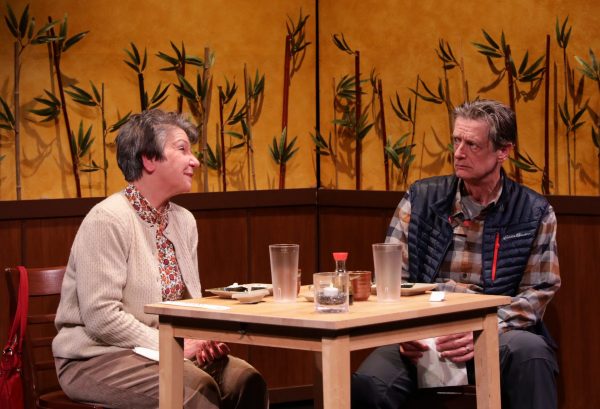Theater Review: “The Treasurer” — Lives of Quiet Disconnection
By Nate Beyer
Cheryl McMahon is quietly spectacular as Ida, who tries desperately to conceal her cognitive decline behind a wall of egocentric cheerfulness that borders on the frantic.
The Treasurer by Max Posner. Directed by Rebecca Bradshaw. Staged by the Lyric Stage Company of Boston, 40 Clarendon Street, 2nd Floor, Boston, MA, through March 22.

Cheryl McMahon and Ken Cheeseman in the Lyric Stage production of The Treasurer. Photo: Mark S. Howard.
There’s a lot of isolation in Max Posner’s The Treasurer. Characters speak to each other by phone, mainly. Face-to-face conversations usually take place between strangers — customers and salespeople, conversations on airplanes. The point is clear: people in the modern world are disconnected, even if they are family members, even if one member is slipping away.
The relative slipping away is Ida Armstrong (Cheryl McMahon), whose husband, represented by an armchair in this inventive script, passes away early in the play (as all good armchairs do, I’m afraid). The actor is quietly spectacular as Ida, who tries desperately to conceal her cognitive decline behind a wall of egocentric cheerfulness that borders on the frantic. The action focuses on one of her three sons (Ken Cheeseman), who is billed as “The Son” in the program. He has been elected by his brothers as the treasurer, the unlucky son who must somehow keep track of mom’s chronic overspending. Never one to be confined by financial reality, Ida insists on moving to a wildly expensive senior living community; she has also gifted several thousand dollars (that she doesn’t have) to the Albany Symphony Orchestra. However, the biggest fly in the ointment is not Ida’s spending or her incipient dementia. She ran off with another man years before, effectively abandoning her children.
The action begins in the Son’s head. We overhear his thoughts as he is commuting on a bike to work. The implication, as in Tennessee Williams’s The Glass Menagerie (which Posner references in the script), is that this is an exploration of memory, specifically family memories. The Son tells us he is going to hell — because he doesn’t love his mother and wishes she were dead. This is a two-ton revelation, but Cheeseman delivers it with enough humanity and humor to evoke a painful truth. Revealingly, as Son tries to address his mother’s spending via a series of phone calls, he is surprisingly inconsistent: he admonishes her while ultimately giving in to her wishes. So there is love there, in addition to guilt and trauma.
Director Rebecca Bradshaw makes use of creative staging to suggest that the inner lives of Posner’s characters are being dramatized. The set and lighting is minimal: large aluminum frames imply walls, with an occasional door or a miniature picket fence set in front. The scenery is put in place by stagehands at the start of each scene. Sometimes the actors walk through the frames (though not every transition is seamless). Robert Najarian and Shanaé Burch play multiple roles, including brothers Allen and Jeremy. This multiplication reminds audience members that what we are seeing is more than one part imagination.
McMahon’s Ida is initially a slightly shrill, brittle woman who wants approval and connection on her own terms. She is an actor who has lost her script, filling in the gaps by playing the character bigger and bigger. In one scene, desperate to win over Ronnette (Burch), a Talbot’s salesperson and woman of color, Ida talks up her (alleged) accomplishments and her “deep feelings” for Martin Luther King Jr. Both actors are pitch perfect here — McMahon is trying to manufacture some sort of appeal while Burch is both intrigued by Ida’s tall tales of female empowerment and repelled by her patronizing appeal to race. It’s a scene that one can imagine overhearing at a local mall. As Ida descends further into confusion, McMahon infuses each gesture and expression with the blank astonishment of a person who has been set adrift from the anchor of memory. It is an extension of Ida’s previous improv approach to life — but also new and terrible territory. This is a brilliant performance, nuanced and frightening.
Cheeseman strikes the right balance between awareness of his own anger at his mother and blindness to his own inability to connect with others. In some ways, his is the toughest role. We learn he has a wife and daughters he loves and feels close to. But we don’t see examples of that intimacy. We spend most of our time in his head, listening to him explain, or overhearing his phone calls. Ironically, his most revealing conversation is with a fellow airline passenger. Even then, we explore his life sideways: the fellow passenger (Burch again) comments on her close relationship with her mother and congratulates the son for finding his soulmate. We learn about the son and mother by implication, not confrontation.
And therein lies the problem with this production of The Treasurer. Despite well-drawn characters, impressive performances, and interesting exercises in stagecraft, the evening becomes less than the sum of its parts. There are no visceral encounters in which feelings of abandonment and loss are worked through. Too much is left in soft focus. Worse, at the play’s end Posner opts for metaphysics and misty symbolism. Perhaps the playwright didn’t trust himself enough to allow his alienated characters to speak unpleasant truths to each other (as Williams did). And that is a shame, because Posner’s decaying family seemed to have so much more to say to each other — and to us.
Nate Beyer is a writer and educator, and winner of the St Botolph Foundation Emerging Artist Award. His work has appeared in Dark Sky Magazine, the Arts Fuse, the Adirondack Review, and in print in Attache, the in flight magazine of US Airways. Contact him at nateb123@gmail.com.
Tagged: Cheryl McMahon, Ken Cheeseman, Max Posner, Nate Beyer, The Lyric Stage Company of Boston
